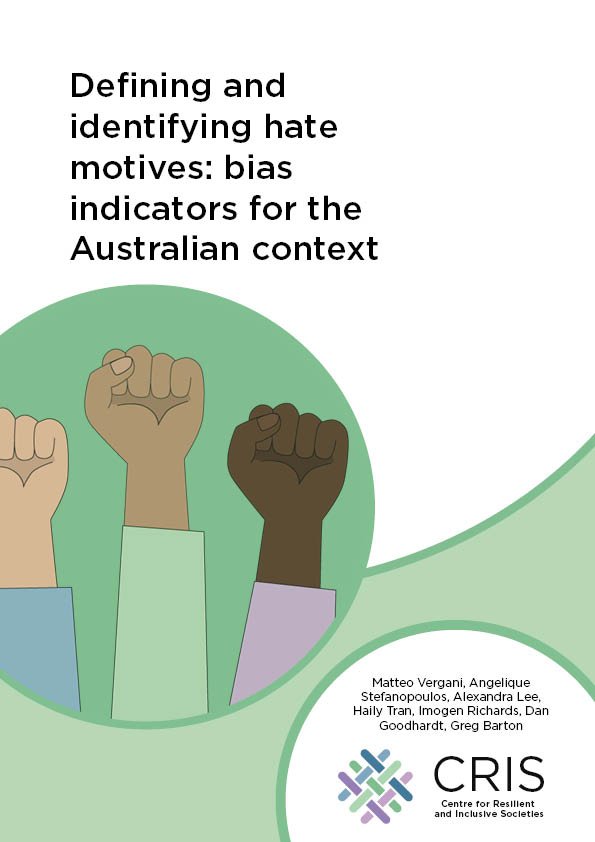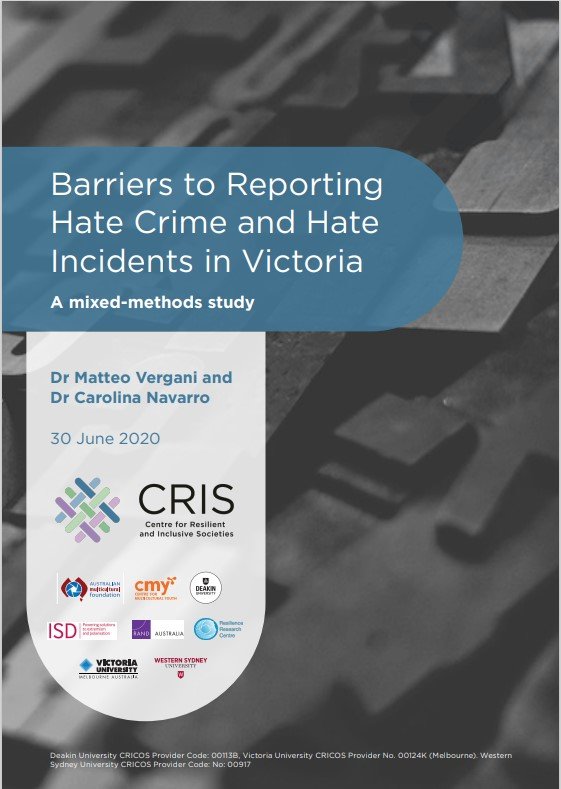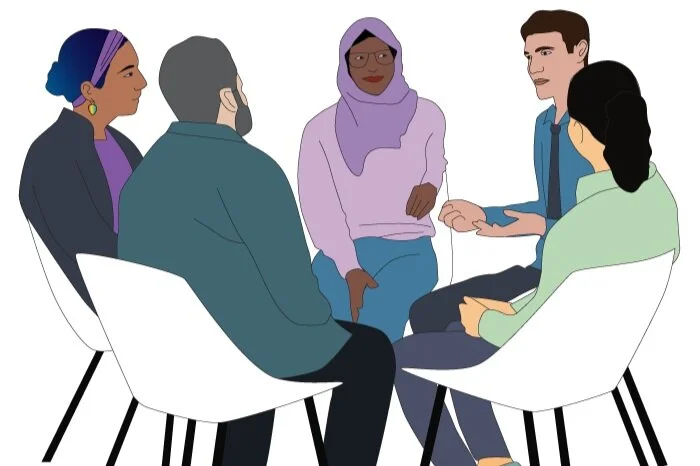Our Current Projects

Capacity building to rebuild trust in civil society, prevent social polarisation and strengthen the resilience of our democracy.
In the past few years Australia, like many other parts the world, has seen an upsurge in racial and religious exclusivism, conspiracy theories and deliberate misinformation, alienation from elected representatives, declining trust in government and non-government institutions, inter-community discord, misogyny, racism, social polarisation, and the intensification and spread of extremism messaging and action. The COVID-19 pandemic exacerbated these trends.
Government initiatives are likely to be less successful where communities have not been seen as trusted partners with agency to design their own outcomes. Increasingly government agencies have therefore base policy and program development based on “empowerment” and “co-design” collaboration and participation. How effective is this approach, in helping to build a resilient and inclusive society, where trust between agencies and communities is under strain.
The project is designed to work with up to three pilot communities to investigate and understand activities, processes and structures that enable or hinder individuals and communities in engaging fully with civil society and democratic processes, including factors that undermine trust in civil society or increases social polarisation.
One aim of this project is the initiate work on a “trust lab” that will explore the benefits to policy making and delivery of reciprocal relationships between government and community actors.

Mapping codesign and codelivery of CVE initiatives in Victoria: lessons learnt to tackle emerging violent extremist threats
The core of building resilient and inclusive societies is for local communities to develop customised approaches based on their own understanding of the risks with which they live and the assets and capacities they bring to coping with challenge, threat, and adversity.
Co-design is based on the understanding that building increasingly self-aware and self-mobilising communities will, in the future, see a reduction in reliance on Government led top-down intervention to complex social policy issues.
While Government remains an important actor in countering these trends, policies and programs from the past few years shows that community capacity building is likely to have a more sustained impact.
The project will map (to the extent that government agencies, for security reasons, permit) the current body of work on co-design and co-delivery of CVE interventions in Victoria. This project will leverage the lessons learnt from these initiatives to inform responses to emerging violent extremist threats and a nation-leading Victorian CVE co-design framework.
Our Completed projects
Publications
Around the world, governments in liberal democracies are increasingly worried by the decline of public trust. The question that is often asked is why individuals and communities have declining trust in government institutions. However, the reverse question – whether governments trust communities, and if not, why not – is far less frequently explored. A relationship of trust involves one party trusting another, and that trust being returned. One key quality of trust is therefore reciprocity. For a successful trust relationship to be created and maintained it must be reciprocal. Trust must flow both ways – not just from communities to government but from government to communities.
This Report examines trust relationships between government and communities that play a role in developing resilience to social harms. The particular focus is on the areas of disaster recovery, emergency response and dealing with violent extremism, and the ways in which government officials implement related programs and policies. The aim of the project is to support government officials and community leaders and members in creating and sustaining the trusting relationships that are needed to deliver these types of resilience building programs.
This research report has been conducted by an NGO called Love Frankie and funded by USAID and contains insightful new research (English and Bahasa) from Love Frankie with USAID on Indonesian youth resilience to violent extremism featuring the BRAVE measure.
Michele Grossman (lead), Greg Barton, Dr Vivian Gerrand, and Michael Ungar (a CRIS Consortium partner).
This report presents bias indicators for the Australian context and discusses their concept, uses, benefits and risks. The bias indicators we present are the result of extensive consultations with local experts including academics and practitioners working in law enforcement agencies, government and non-government organisations and community organisations. We aimed to make sure that the list would be practical and relevant to practitioners working in the fields of hate crime and hate speech.
Matteo Vergani, Angelique Stefanopoulos, Alexandra Lee, Haily Tran, Imogen Richards, Dan Goodhardt, Greg Barton
This report provides important evidence for all stakeholders involved in tackling hate in Victoria, including policy makers, law enforcement agencies and community organisations, to better understand how to address community reporting barriers.
Dr Matteo Vergani & Dr Carolina Navarro
This report is a first in Australia to make sense of the exceptional fragmentation and lack of coordination of responses to hate crimes, hate speech and hate incidents across the country
Dr Matteo Vergani & Rouven Link

CRIS Conference 5-7 October 2021 | Online
Paul Giannasi OBE, Police Hate Crime Policy Lead, National Police Chief's Council
The racially motivated murder of black student Stephen Lawrence, in 1993, was a watershed moment for policing in the UK. When the subsequent inquiry found that the police force was "institutionally racist", there were major changes to policing, and community approaches to racism.
Paul has 30 years of policing experience and led the cross-government hate crime programme for 12 years, where he was responsible for creating new relationships between police, the state and communities to combat hate. Currently the national Police Hate Crime Policy Lead, In this keynote address Paul explains how police and community use “Critical Incident Gold Groups” to set action plans in response to serious incidents at home and overseas. Collaboration between government, nongovernment and academics has lifted the quality of existing data about hate crime, hate incidents and hate speech, to the benefit of all parties and most importantly, of UK communities. The meaningful, trusting relationships between police and non-government organisations have been formalised in Information Sharing Agreements enabling partners to tailor solutions to critical societal problems.

CRIS Conference 5-7 October 2021 | Online
Ro Allen, Victorian Equal Opportunity and Human Rights Commission
Session Chair: Dr Matteo Vergani, Deakin University
Ro commenced their role as Victoria’s Equal Opportunity and Human Rights Commissioner on 1 June 2021. Ro brings more than 25 years of experience in community services, governance and social justice, and has a deep commitment to equality and a broad experience in strategic advocacy. In this panel, Ro will discuss their plans to empower existing – and establish new – collaborations with communities, and the Commission’s plans to tackle hate against a wide range of target groups.

CRIS Conference 5-7 October 2021 | Online
Dr Philip Jefferies, Dalhousie University
Session Chair: Dr Matteo Vergani, Deakin University
Within the growing interest in the study of resilience, there is an increasing interest in measurement. But there are as many different approaches to quantifying resilience as there are ways of conceptualising it. Should we limit ourselves to just a direct assessment of how much a person perceives they can ‘bounce back’ from adversity? Or should we consider specific risk and protective factors that might enable a person or community to demonstrate resilience? And what score must a person or community achieve to be considered ‘resilient’? This discussion provides a review of options for measuring resilience as well as a discussion of their utility in different situations. Contexts include individuals and communities experiencing acute crises as well as ‘everyday’ adversities.

CRIS Conference 5-7 October 2021 | Online
Professor Nicole Asquith, University of Tasmania
Peter Wertheim AM, Executive Council of Australian Jewry
Josh Bull MP, Co-Chair of the Victorian Anti-Racism Taskforce
Session Chair: Professor Greg Barton, Deakin University
In this panel session, moderated by Prof Greg Barton, we will explore why a database of hate behaviours can contribute to advance fairness, equality, respect and understanding. Panellists will include Prof Nicole Asquith, Director of the Tasmanian Institute of Law Enforcement Studies and Secretary of the Australian Hate Crime Network, and Mr Peter Wertheim, co-CEO of the Executive Council of Australian Jewry. The panellists will discuss how a database of hate can be useful to academics, civil society organisations and government.

Dr Matteo Vergani discusses quantitative and qualitative data methods.

Dr Matteo Vergani hosts the discussion: ‘Towards a national system for classifying and recording hate crimes in Australia’ with speakers Senator the Hon Kristina Keneally, Mr Luke Cornelius APM and Race Commissioner Mr Chin Tan.
National security is not a zero-sum game. If the past two decades have taught us anything about breaking the cycle of terrorist violence, it is that in the longer-run, treating people well – upholding justice and acting with compassion and humanity – keeps everyone safer.
Mark Duckworth writes on trust as one of the themes running through emergency management diversity and inclusion and resilience policies in Australia and New Zealand. Are diverse communities seen as problems rather than as trusted partners with agency to design their own outcomes?
Protests against Victoria’s proposed pandemic bill are made up of a mix of groups, but Dr Josh Roose, an expert in far-right extremism and conspiracy theories, explains why their roots are particularly worrying.
Preventing or countering ‘violent extremism’ (P/CVE) is a highly contentious field that has increasingly characterised counter-terrorism policy, in the UK and internationally, over the last 20 years. Joel Busher, Tufyal Choudhury and Paul Thomas assess the implications of current efforts to ‘mainstream’ P/CVE into other policy areas.
CRIS Researcher, Dr Josh Roose, discusses the recent protests in Melbourne and provides context to the far-right element of the anti-vax movement and suggests three approaches to moving forward.
A parliamentary inquiry into violent extremism should call on tech companies to reveal their recommendation algorithms.
Mark Duckworth discusses the new National Recovery and Resilience Agency and makes the case for strong community partnerships to co-design programs and projects.
In a world contaminated by all manners of chemicals and ravaged by climate change, it is unsurprising that wellness and detox practices have broad appeal.
























Social cohesion is often talked about as a measure of how well a society or community is placed to resist or mitigate the likelihood of violent extremism taking hold. But what do we mean when we talk about ‘social cohesion’ in relation to violent extremism? And what is the role of young people in fostering the kinds of social cohesion and social futures that can make a positive difference when it comes to building healthy communities that can resist appeals to violent radicalisation?